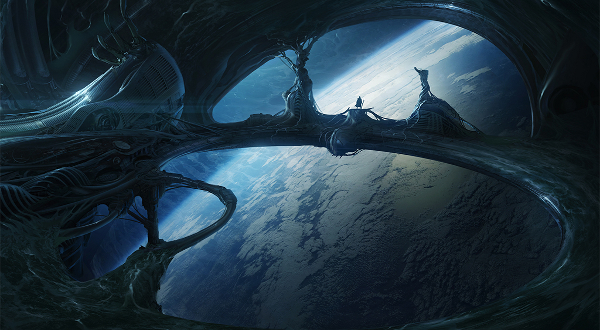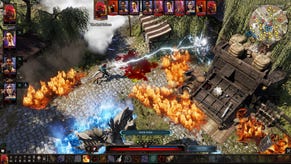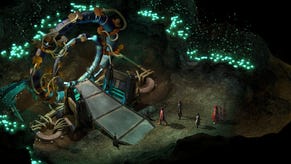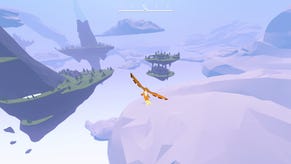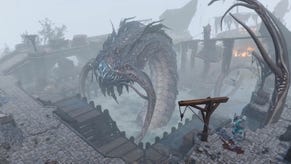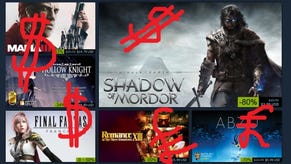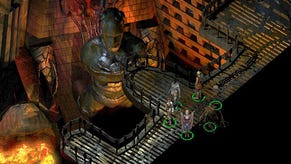Torment: Tides Of NumeneraHow inXile Are Bringing Pen-and-Paper To PC
Taking Effort
I'm interested in Torment: Tides of Numenera [official site], but not for the typical reason around these parts - I've only ever played the first two hours of Planescape: Torment, to which the game is a spiritual successor. Instead, my interest is the result of playing the game's other source material: Numenera, a pen-and-paper roleplaying game set a billion years in the future, which throws out much of the levelling, stats and combat of D&D-derived games in favour of a streamlined system that favours storytelling and improvisation above numbers and hard rules.
Curious about how many of the pen-and-papers unusual systems were being translated to a computer RPG, I spoke to inXile's Colin McComb and Thomas Beeker - creative lead and associate producer, respectively - about bringing effort, cyphers, GM intrusions and backstories to the PC.
RPS: What made you choose Numenera as the base for a new Torment game - was it the story and world, or the mechanics?
Colin McComb: It was mostly based on the world. I did get to do some of the playtesting when Monte [Cook, the designer of the pen-and-paper Numenera] was developing the cypher system, but it was... When we were developing the idea for Torment at the very beginning, Adam and I defined four pillars of what would be necessary to make a Torment game, and one of those was a world that's unlike any other, and Numenera's got that in spades. I don't think there's any game out there right now that does anything anywhere near it. We saw that and Adam and I were like, 'We gotta take that one.' If possible, if Monte would licence it to us. It turned out he was pretty excited about it.
RPS: What's your favourite thing about the setting?
McComb: Well, I'm a big Gene Wolfe nerd. The whole Book of the New Sun has been a huge literary influence. Shadow of the Torturer, Claw of the Conciliator, that whole series. I just love the idea of thinking about what it is that humans are going to become, what the world is going to become after we're all dust. It ties in really well with our legacy question, too - what does one life matter? When you're talking a billion years in the future, none of this is going to matter, that made it a natural fit as well.
But of the setting itself, just the fact that it's so weirdly evocative and imaginative and cool.
RPS: What stuff are you lifting mechanically from Numenera?
McComb: Everything. We're doing Effort, we're doing the three pools, we're doing cypher poisoning. We're basically trying to make it as closely representative of the Numenera tabletop experience as possible.
Beekers: We have freedom to adapt it, because not everything makes as much sense. The focus of Numenera, a lot of it is on simplicity, which makes sense for pen-and-paper because it keeps the flow going. That's not as big an issue for us, so we're all choose to make things more complex in underlying mechanics but still keep the same flow going.
RPS: Can you give an example of an area where you've added complexity?
McComb: Obviously random number generation, any of the complex rolls that we're doing, I don't think we're just going with a straight d20 under the hood. Then there's the random encounter generation; we're not doing a lot of that, but. Anything involving rolls.
Thomas Beekers: Just the way Effort works is a good example, because you kind of have to back and forth on it with a videogame, and we can do a lot of that quite easily in computer games. So we can throw little things out there to make it work for us, but I would say everything works essentially like the pen-and-paper.
RPS: Are you doing stuff with GM intrusions?
McComb: Yes, we are.
RPS: How does that work when there's no GM?
McComb: That's a randomised thing that's going to depend on the number of sleeps you have, the... I'm trying to think of what things effect that without giving away any spoilers... There are things that are going to happen in crises - the encounters and the battles that you'll have - where suddenly things will take a turn for the worse and you can choose to accept that or reject it and get the XP for it.
Beekers: But it does work differently. That's a system that works very well in pen-and-paper and you really have to just make it work on computer, so we're doing something similar but it's different. We're at the stage now where this is something you have to play to see how it works, so anything we say right now will be a bit up in the air because we're going to have to play it and see how it works and then adjust it to make it work.
McComb: We don't want to make any promises. We've learned a lesson on that.
RPS: Do you link character progression to backstory development in the same way as Numenera - that thing of, if you want to give yourself a particular skill, you come up with a backstory for your character to justify how you know it?
McComb: I think that's currently the plan, yeah. We want to make sure that we have a good story reason for everything so it seems seamless, and interactive as opposed to just, 'Woop, you hit a tier, and now you can cast a fireball!'. Because that makes it feel like, 'But what did I do to get that?' I've been designing games for twenty years and I still don't know how to cast a fireball, so maybe I just haven't hit the right level yet.
RPS: Given the Effort system, does that radically change how you balance the game over the course of it? Because the Effort system allows you to make certain tasks trivial for your character if you're actually good at it.
McComb: But it's depleting your pools.
Beekers: The question for balance is not the Effort itself, it's the depletion of pools and how you recharge it. So when we're looking at Effort we're mostly looking at management of pools and estimating how many points someone has to spend, and how many rest opportunities we want to give them, because you cannot rest anywhere in the game. You cannot be constantly recharging your pools, because that would make everything free, but we have our methods of limiting that.
McComb: Yeah, we've got an urgency mechanic that we're trying out that we want to make sure works and that it's not just annoying.
RPS: So that's changing the rest system from the thing of--
McComb: Oh, you still get the four rests - I still get the instantaneous, the ten minute, the one hour, and the overnight - and it's the hour and overnight that we're trying to rope in. But each of those things increments the urgency, and if you do that too many times it's possible that it'll trigger a GM intrusion essentially.
RPS: That's interesting.
Beekers: That's sort of the same mechanic in Numenera where a GM would say, 'But you can't really rest right now.' It's the same logic, we just have to figure out a good pacing and presentation for it that doesn't feel annoying to the player.
McComb: Right, like Mask of the Betrayer had the spirit-eating and even George said that it annoyed him. Our lead area designer is George Ziets and he was the creative lead on Obsidian's Mask of the Betrayer, and he said that he just found it really frustrating and annoying and he wishes he hadn't included it, so we want to make sure that our urgency mechanic is not annoying.
RPS: Most computer RPGs are based on the D&D model of combat and stats and progression. Does making it more based on something like Numenera, which is less well-known because it doesn't have that history, does it make it harder to get players to understand or relate to it?
McComb: I don't think so. It's going to depend on the tutorialisation that we do in the early part of the game, but from what we have developed right now it seems like we've got a pretty good natural progression of accreting these skills so they'll feel natural to the player.
Beekers: But I think we do have an awareness that we have to tutorialise, not necessarily more, but be aware of the fact that some of these systems are not going to be intuitive. Some of these concepts like not getting XP for a kill is something that we have to present in a way that does make sense to the player. It's new enough that you just have to tutorialise it better, whereas with a D&D game you can just be like, 'ach, everyone already knows how this works anyway.'
RPS: Similar to the XP thing: cyphers appear really special but most computer RPGs throw loot at you all the time. Do you expand the loot system so... will I be raking through bins like a binraker, picking up loafs of bread?
McComb: Everyone on the design team has expressed great distaste for the 'Why would somebody hide something like this?'. Why are they going to be hiding their loot bag inside a barrel of ale?
Beekers: That's not going to happen. But that's actually the good with Numenera, because cyphers are not necessarily things that you pick up that someone dropped there. It's part of a machine that you cobbled together into a tool, and that's how we present it at times as well.
McComb: Yeah, and I don't think we're going to have totally destructible environments where you just go through and smash everything in a pottery shop and he just stands there and watches.
Beekers: I think the interesting challenge of cyphers for us is going to be because-- I do the item design for the game, it's good and fun to come up with unique cyphers, but the angle is so different because usually the player's instinct is, 'I'm going to hoard all this stuff and keep it for a big boss,' but we have to make players understand that you get cyphers all the time and you have to use them all the time. At first opportunity.
McComb: Have you guys done cypher poisoning yet in your game?
RPS: No.
McComb: You've got a cypher limit, essentially. If you start carrying more than that, the chance of something really bad happening - explosions, mutations, you know.
Beekers: It's not a hard limit [on how many you can carry], but the things that will happen are so bad that it might as well be. Really nasty things can happen.
But if you've played the Numenera pen-and-paper you've probably felt how different that feels and your instinct adapting and being more open to just using the item right away. I think that will actually be really cool in Torment, if we do it right.
McComb: Monte is always saying that the cyphers are essentially one-shot special powers. Think of it as potions, but even accumulated faster than potions, so it's something that you're always finding and always using.
RPS: You mentioned taking pieces of machinery. How does that crafting system work relative to other computer games?
Beekers: It's a bit closer to modifying and cobbling together weapons than...
McComb: It's not like Minecraft. Each item is going to have slots essentially that you can attach stuff to, to create like magnetic effects or fire effects or gravity effects. So suddenly you've got a gravity-disrupting sword and you hit someone with it and weird things happen... I don't know that we have gravity in the game.
RPS: Does Monte play games of it and give feedback?
McComb: Right now it's mostly describing things to him. We've got some builds out, but I don't know that he's actually played them.
Beekers: I know that we've provided them to Monte Cook Games, but it's kind of in that stage where it's not that useful yet to play. It needs to hit a certain point and then we'll probably ask him to play it for at least a few hours to give us feedback, but he's not constantly playing rough versions and giving feedback. That's one of the reasons we like working with him, he's not like a hands-on license holder, he's not constantly in our stuff reviewing everything.
McComb: I think he's pretty confident that we're respectful of his license and his ideas... The fool. [laughs]
This article was originally part of the RPS Supporter Program. Thanks for supporting RPS!



